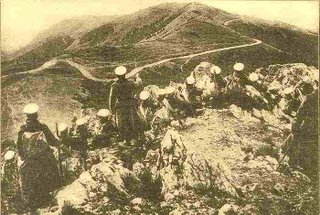Macedonia during World War I

"..World War I
In August 1903, VMRO organized the Ilinden uprising, the first major action, crushed by the Ottomans after a little bit more than a week. An anarchist faction of the VMRO, the Gemidzhi, organized a series of sabotages against Western properties in Thessalonica, hoping for a Western intervention (Phillips 26), which seems to have been the goal of the uprising. However, the Western powers decided to “continue their policy of status quo” (Poulton 56). The major accomplishment of the Ilinden uprising was the creation of the Krushevo Republic, which lasted for about a week, before crushed by the Ottomans. Although a complete failure, the Ilinden uprising represents a turning point in Macedonian history, especially from the point of contemporary Slav Macedonians, because the Krushevo Republic was the first modern independent Macedonian state, and “an expression of the desire of [the Macedonians] for the creation of a national state ”.
The newly formed states in the Balkans were gaining in strength, both militarily and diplomatically. Since all of them were under the Ottomans for a long time, the shifted balance of power opened a strong possibility for those countries allying against the Ottoman Empire, but division of Macedonia was the greatest obstacle in achieving unity (Poulton 73). After the first Balkan War, the allied forces of Bulgaria, Serbia, Montenegro and Greece managed to drive Turkey out of Europe, but the alliance failed when it came to dividing the conquered territories of Macedonia, which was the cause for the second Balkan War.
The effects of the Balkan wars were the creation of an independent Albanian state and partition of Macedonia among Serbia, Bulgaria and Greece. The partition of Macedonia also left the three Balkan powers dissatisfied with their territorial gains and losses and combined with other crises in the international arena led to the beginning of World War I. “A Carnegie Endowment international commission of inquiry arrived in Macedonia at the end of the Balkan war. It reported in detail the brutal treatment handed out by all combatants to their enemies and to the civilian population” (Phillips 30).
During World War I, Bulgaria allied with Central powers and occupied most of Macedonia, persecuting Greeks and Serbs (Poulton 76) as a revenge for Balkan wars. However, since Bulgaria was on the losing side in World War I, Macedonia was again divided in three parts after the war. As Phillips notes, “in the 1920s, the Macedonian national identity was still indistinct” (31). The Serbian government considered the Slavs of Vardar Macedonia to be Southern Serbs (Poulton 90), the Greek government considering their Slavs as ‘Slavophone Greeks’ (Poulton 85). Bulgaria was still claiming Slav Macedonians to be Bulgarians. VMRO had claims of an independent Macedonia (Poulton 83), which led them to ally themselves with fascist organizations – Italian and Hungarian fascists, as well as the Croatian Ustashas, with whom they have organized the assassination of the Yugoslav king Alexander in 1934 (Phillips 31), as a response to ‘Serbization’ of Vardar Macedonians and centralist policies of the Yugoslav government...."
http://www.answers.com/topic/macedonian-question


1 Comments:
Hi! is about Macedonia
www.lovemacedonia.blogspot.com
bye :-)
Post a Comment
<< Home